- About Us
- Columns
- Letters
- Cartoons
- The Udder Limits
- Archives
- Ezy Reading Archive
- 2024 Cud Archives
- 2023 Cud Archives
- 2022 Cud Archives
- 2021 Cud Archives
- 2020 Cud Archives
- 2015-2019
- 2010-2014
- 2004-2009
 |
Cud Flashes In the Pan |
This month’s theme:
Holiday Bells
Yes, I said HOLIDAY. If that offends you, then Happy Winter Solstice! Here’s a trio of stories from holiday bell songs.
“Jingle Bells”
Zombie
By David M. Fitzpatrick
I could see my group sitting by the fire, all twenty-five of them, although I was thirty feet away at the edge of the light and heat, by the woods. I liked to look up at the sky, and the fire made it tough to see the universe around us. The night was so dark and the sky so clear that even in the bonfire’s blazing orange light I could see the stars twinkling above like lights on a Christmas tree back when the world had electricity.
The beautiful view was interrupted only by the talk and laughter of our group around the fire—and, of course, the bells. They jingled away in a fairly unmelodious euphony off in the darkness, beyond the trees that surrounded our sprawling village. Even without sheet music, the random jingling sounds were relaxing.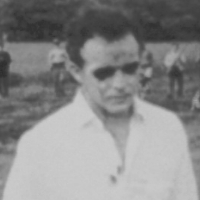
“More cider, Ray?”
I’d been staring up at the hazy band of the Milky Way, since I was standing far enough from the fire that the light from that didn’t wash out my vision. It was cold this far from the heat, but the galactic view was worth it. I hadn’t realized how I was shaking until Betty had spoken. She was bundled up in her green winter coat, fluffy white scarf, puffy red mittens, and tall black boots, and she was holding one of the teapots. She looked like a Christmas card standing there. The spicy scent of the hot apple cider hit my nostrils and it was heavenly.
“Please,” I said, holding out my empty cup. She filled it. I sipped it, savored it. The bells jingled in the darkness. The effect was as if Santa Claus himself were flying around our village in the darkness, just out of sight.
I remembered her coat, scarf, mittens, and boots, in fact. I’d been with her when we’d gone through that abandoned house in October and found them. They weren’t bargain brands; they were L.L. Bean, and she’d been ecstatic when everything had fit her. The cold weather had been looming, and to find such nice winter clothing for her had been very fortuitous.
She just stood, watching me drink the cider, and listening to the bells jingling through the woods. I could tell how she looked at me. At least I hoped. We’d met on the road a few months ago and hadn’t gotten along at first, but we’d grown to be close friends. Maybe something more, and maybe even more than that soon. It was the apocalypse, after all. No time for the usual long courtships and man-and-woman romance games.
“I love the bells,” she finally said in the darkness. “It was a great idea you had. It brings a bit of Christmas to the world.”
I chuckled. “Too bad they aren’t playing Christmas carols.”
“It’s better than nothing.” She waited several beats, and I could see her face as she stared past me, towards the jingling in the darkness, as if trying to decide whether to say what she was thinking. Finally, she did: “It’s kind of romantic.”
She met my eyes, and in one moment we both knew that what she said was romantic, but in the next we both realized how silly it was. As if on cue, we both laughed. “I mean, if you don’t consider who’s jingling them,” she said.
Suddenly, I heard one of the bells jingling a bit closer than it had been. I was attuned to all the bell sounds, so I heard it before Betty did. I searched the darkness.
“What is it?” she whispered.
Then it was clear: One minor chorus of bells was jingling louder and louder, coming closer to the camp. She realized it before I had to tell her.
“Ray,” she said.
But I was already drawing my machete out of its sheath, turning to face the darkness. The jingling intensified, and then we could hear the shuffling footsteps through the leaf-covered forest floor. And soon after we could hear the noises it made—the snarling, the growling, all while jingling.
And then it appeared, emerging from the darkness as if it were materializing out of nowhere. Its gaunt features, its red eyes, its gnashing teeth—it was as terrible as it always was, and when it saw us, that primitive drive to eat gave it a look of almost obsessive, murderous hope on its undead face.
It was stopped short of where we were, running smack into the lines of barbed wire that surrounded the village. It wasn’t smart enough to climb through it; it just kept trying to move forward, its arms reaching through and trying to grasp at us. Betty and I backed away a step. I brandished my machete.
“It broke its tether,” I said. “Nothing to do about it tonight. We’ll have to kill this one and find a new one tomorrow morning.” And I raised the machete, preparing to slice through its rotting brain.
“Wait,” Betty said.
I waited, brow raised as I looked at her. The zombie flailed and reached for us, straining against the barbed wire, and all the while the half-dozen silver and gold bells hanging off the dead man’s belt jingled away.
“I just love the bells,” she said. “It almost seems sad to kill this one. It will just mean fewer bells.”
In the distance all around, the light euphony of bells continued. In front of us, these six bells kept jingling. Would we really miss these few?
But Betty wanted to hear them, and this was about that apocalyptic courtship, right?
I smiled. “No problem.”
* * *
I stood by the barbed-wire fence, listening to the distant bells. Behind me, that one lone bell jingled haphazardly away. My cider was gone, and the chill in the air had me shivering again. The group was still laughing and talking by the bonfire some distance away. I could barely feel the heat this far out.
I saw Betty approaching. All I saw at first was her silhouette against the orange glow of the bonfire. Even decked out in her winter gear, there was no mistaking the sway of her ample hips as she moved toward me. She was very attractive. And as she got closer to me and I could see her face, I was reminded how beautiful she was, too.
She had the teapot, and she refilled my cup. I thanked her, and we stood in silence together, our coat sleeves almost touching, listening to our group around the fire, listening to all the bells. And listening to the small chorus of bells behind us.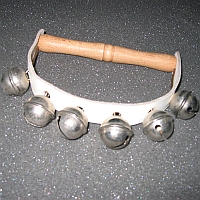
“It’s a cold night,” she said. “Maybe you and I could keep each other warm later.”
Yes, no time for lengthy courtships in the zombie apocalypse.
“I think that’s a great idea.”
She moved in and leaned against me, and she lay her head on my shoulder. I put my arm around her. Drawn together by the apocalypse? Sure. Drawn together by friendship? Definitely. Drawn together by sexual attraction? No doubt. But these things had built slowly over the months since we met, and tonight we had been drawn together by the cold, the hot cider, and those few silver and gold jingle bells behind us.
I looked over my shoulder at him.
His head hung from the barbed wire. I’d decapitated him under the chin, so no lungs, no larynx, no way to make noise. All he could do was chomp his jaw, endlessly trying to eat us, and that neverending motion made the bells that dangled from six spots on his cheeks, his chin, and his nose jingle just for us.
Hey, these days, I’ll take the romantic cues wherever I can get them.
“Silver Bells”
Contemporary Fantasy
By David M. Fitzpatrick
Miles O’Keefe didn’t want to go home. Not tonight. He couldn’t face Kelley in the morning.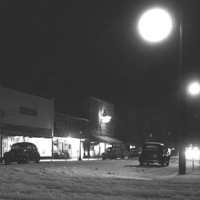
So he walked his beat along the snowy sidewalks of the city, gripping his nightstick in one heavily gloved hand, his boots crunching footprints as he went. Every step resulted in his right knee yelping a bit in pain, always reminding him of what had happened and why he dreaded going home. It was just him, his bad knee, his terrible guilt, and the midnight snowstorm. The war in Europe was raging, but it seemed like this lonely street didn’t know or care. It certainly didn’t care that it was Christmas Eve, and that in the morning O’Keefe would have to be home to see his daughter’s hopes forever dashed.
He heard the sound of bells ahead, and he saw a man standing under the street lamp up ahead. It was late, so it was surprising that a street Santa or performer would be out, especially on Christmas Eve. O’Keefe slid his nightstick into his belt holder, so as to not intimidate the man, and strode towards the bell-ringer.
There wasn’t yet enough snow to bury the city, but already there several good inches of powder. A cool winter breeze blew it about the undriven street and untrodden sidewalk. So when O’Keefe finally trudged his knee-pained way to the bell-ringer, the first thing he noticed was that there were no footprints around the man. O’Keefe had been by there a half-hour before, and there had been no one there, so there should have been some sign of the man’s approach. As he was considering this, the man turned to him and greeted him with a wide smile.
“Officer!” the man cried. His teeth were perfect white, and he looked about O’Keefe’s age, nearing forty. He held two large silver bells. “Tell me, do I sound okay?”
He began waving the bells, and he moved his hands into different positions to achieve various notes. He rang his bells to the tune of “Jingle Bells,” and O’Keefe had to admit that it was incredible. Usually, a line of people playing various notes worked together, but this guy was solo.
O’Keefe waited until the man was done, and he nodded in appreciation. “That was impressive, sir. I admit I have no idea how you make those bells ring different notes. I always thought bells pretty much just played one note.”
“Normally, but these are magic bells,” said the bell-ringer. “They’re made of the purest silver, enchanted with a minor cantrip which I devised to enable them to sound different notes depending on how I move them. Listen.”
O’Keefe was about to interrupt the man to ask him how much he’d had to drink, but the bell-ringer launched into a spectacular rendition of “Winter Wonderland,” and not only did he ring many different notes but his range was across several octaves. With every wave of his bells, the shiny silver reflected the bright street lamp above. It was simply the greatest musical performance O’Keefe had ever seen.
When the bell-ringer finished, O’Keefe applauded with gloved hands. “Tremendous! But it’s nearly midnight, in the middle of a snowstorm, with not a soul around. The streets have been empty for hours. I see no hat or donation bucket. Who are you playing for out here?”
“Why, I’m playing for you, Officer Miles O’Keefe.”
O’Keefe gave him a sideways look. “Now, how do you know my name, sir?”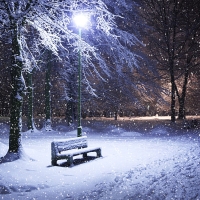
“Tell me about James Donnelly.”
That caught him off guard. O’Keefe felt his heart skip a beat. “How…?”
“Just tell me,” the bell-ringer said, and O’Keefe just knew that he had to.
“He was a burglar. Small-time guy. I caught him housebreaking and when I tried to take him down he fought me hard. Broke my knee. And he’d have beaten me to death if a couple of other cops hadn’t shown up and hauled him off me.”
“And you were injured. But a hero?”
“No, not me. Those cops, they were the heroes—got medals and all. I got surgery and a bum knee out of it. I lost a lot of time off the job and a lot of pay and for a while.” He didn’t even know why he was talking so easily to the bell-ringer—he didn’t even know his name—but somehow it was right.
“So home life has been tough?”
“Hell, yeah,” O’Keefe said. “Bills piled up. I’ve gotten back on track, caught up on everything, but… well, it’s a tight Christmas this year. Food enough to eat, thanks to the wives of the other cops pitching in, but…”
He trailed off as the wind picked up. It was so difficult to talk about it.
“It’s little Kelley,” the bell-ringer said. “You have no presents for her to open?”
“A few small things,” O’Keefe said, fighting back the tears against the icy cold. “In the morning my little girl will get some crayons and a coloring book, a book of Grimm’s fairy tales, a few other things. But she only wanted one thing all year long—a bisque doll, one of those expensive porcelain dolls. She saw one of these in the store last January and fell right in love with it. ‘It’s the most beautiful doll in the world,’ she’d tell me. ‘It’s all I ever want, Daddy.’ I promised her that if she was good all year, she’d get one. And she was the best kid any parent could want, for eleven solid months. But I was out of work, and the bills piled up, and we didn’t know if we’d make it, and those dolls are so expensive…”
He was sobbing now, felt the tears tracing icy paths down his cheeks. “Do you remember what it was like, hoping and dreaming for that one special gift that meant the world to you?”
“Do you?”
“Oh, but do I. I wanted a clockwork train set—remember the ones Meccano used to make? I saw one in a department store and I wanted one so bad I could taste it. ‘Be a good boy this year, and you’ll have one at Christmas,’ my parents told me. And I was the best boy all year long. And on Christmas morning, I ran out of my bedroom, hoping and dreaming that it would be there, and it was. That clockwork train was set up in the living room and it was the greatest moment of my young life. When I was grown, I remembered how special that gift was, and how hard my father worked to make it happen. I still have it to this day.”
As if adding injury to insult, his knee abruptly spasmed. The pain shot up and down his leg, and he was unsteady on his feet. He sucked in his breath, grabbing for it with his right hand as the bell-ringer watched.
“But my little girl won’t have that experience,” he said. “She’ll wake in a few hours, full of hopes and dreams, and they’ll all be dashed. I’ve failed as a father, and this will leave a bitter taste in her mouth for the rest of her life. I had such a dream for her this Christmas morning, but now, more than anything, I don’t want to go home. Because dreams don’t come true.”
The bell-ringer smiled at him, and when he gestured the bell in his hand clinged.
“Oh, but they do, Officer O’Keefe,” he said. “That’s why I’m here. I can help. We each have our calling cards; mine just happens to be these bells. But it’s the magic that will help you.”
“What are you supposed to be—some kind of angel?” O’Keefe said, laughing.
“Nothing so religious, Miles. I’m here for you tonight, but tomorrow I’ll be for someone else on a summer day a century ago. The day after that I’ll be for someone on Halloween a century from now—or for someone on any day of any year. It doesn’t matter who or when. It matters that you’re a good man, Miles. That’s who we help.”
Somehow, O’Keefe began coming to his senses. “Who the hell are you, mister? Seriously—what’s your name?”
The wind suddenly blustered and snow swirled madly about as if a tornado had descended upon them. The force was overpowering, and O’Keefe was blinded by white deluge. He threw his hands up against the assault, but the wind abruptly died and he blinked in surprise.
The street and sidewalk were still covered in snow, but the bell-ringer was nowhere to be seen. O’Keefe spun about, but still no sign; behind him, O’Keefe saw his own footprints coming up the street, the right one marked by a dragging furrow between the steps. Snow was slowly burying the prints, but they were still visible. And then he remembered that the bell-ringer had had no footprints to indicate his arrival, so he spun back to where the man had stood—and there were no footprints leading away, not in any direction.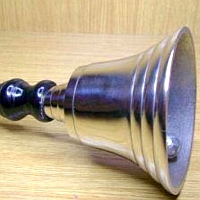
He realized, in his confusion, that he had just pivoted madly—twice—on his right foot, and his knee hadn’t hurt a bit. But before he could think about that, he looked down at the spot where the bell-ringer had stood. In that very spot, sitting in the snow, was a large wooden box. He jaw sagged and he held his breath as he leaned forward and lifted the lid.
The bisque doll within was the most beautiful thing he’d ever seen. Her porcelain face was carefully made up, with intricate layers of coloring baked into what looked like real skin. Cascading blond curls tumbled about her head and shoulders, looking as if styled by a hairdresser. Her gown was practically royal: white, like the most expensive wedding dress, but with blue and purple accents. She looked up at him with deep blue eyes, lifeless yet full of life, as if waiting for the right pair of little-girl eyes to meet her gaze.
He was aware of all of this, but he could only look at the decorative belt about the doll’s dainty waist. At each hip hung a tiny silver bell. His daughter would always see the bells as playthings, but O’Keefe knew that they’d always be reminders to him of what had happened this night.
O’Keefe closed his eyes, but that didn’t stop the tears from coming. He felt them freezing to his cheeks in the cold, and it was the finest feeling ever.
He couldn’t wait to get home.
“Jingle Bell Rock ”
Sci-Fi
By David M. Fitzpatrick
It was just supposed to be a fun thing. Captain Nicholas had taken command of the interstellar United Earth Ship Dawnbound, with its crew of sixty and passengers numbering over twelve hundred, sailing a seventh of the way across the galaxy for the planet Eos. It was a two-year trip made possible by the Dawnbound’s new spacetime-warp drive.
But two years was still a long time. I know. I was there for all of it. I was a bridge officer, serving under Nicholas every day. He was a natural leader from the start, and before we set sail he had a mandate: The dining hall was open to everyone all the time, but once per week every last soul on the ship was to dine together. It was part of Captain Nicholas’ team-building plans—to bring a ship full of strangers together a hundred times over their voyage. By the time the colonists reached Eos, they’d already be a community. Some might have thought such things were silly, but this man had a charisma like no one I’ve ever met. Whatever he said, it made sense, and you did it, and darned if you didn’t love doing it.
To give them a symbol to rally around, Captain Nicholas installed a dinner bell in the Dawnbound’s dining hall. It wasn’t a huge bell, but it was big enough, and when he called the post-dinner discussion to order, its ringing echoed sharply through the hall and got everyone’s attention. Soon, he devised other ways to use the bell. Got some great news about your week? Come on up and ring the bell. Want to give a brief speech honoring a shipmate? Jump up there and ring it. That new couple that has been gazing lovingly into each other’s eyes at dinner? Ring that thing to make them kiss, while everyone else cheers them on. Everyone just hanging out drinking coffee and reading books and you want to wake them all up? CLANG!
It became known as The Bell, and everyone had fond thoughts about it. There was talk of erecting it in the first town square when we built the first town on Eos, but fate had other plans.
Probes had scouted two thousand potential habitable worlds across this part of the galaxy and forty of those worlds had been chosen. A ship was headed to each of those worlds, and ultimately they all made it to its destination world. Occasionally, someone died en route for whatever reason, but it was rare. The UES Dawnbound made it almost to orbital insertion around Eos before anyone was lost.
The ship was so damaged after the crash that it was impossible to figure out just what had gone wrong. The insertion went wrong, the ship nosed into the atmosphere, the shields failed, and the ship’s protective skin was ripped apart and something exploded. I was on the bridge when it went down, and I still don’t know what happened. What I do know is that the helmsman died in those chaotic first moments, and it was Captain Nicholas himself who took the helm and somehow, against impossible odds, kept the Dawnbound from plummeting straight to the planet below. He managed to wrestle it somewhat under his control, level it out, and keep it aloft as long as he could.
All the while, he barked orders above the hollering and screaming and explosions and alert sirens. He ordered things to be done to the engines, to brake the ship in the atmosphere, to vent plasma to keep the spacetime-warp engines from going critical, and more. With almost no steering control left, he managed to avoid a towering mountain range and bring the Dawnbound into a shallow approach over an endless forest before finally taking her down.
No matter how you looked at it, it was not going to end well. We hit at extreme speeds, and that behemoth vessel plowed through the forest, bouncing and teetering, until it nosed over a hill and tumbled head over heels towards an inland sea below. When it finally came to a rest upright, although tilted dangerously to starboard, Captain Nicholas didn’t waste one moment: He began demanding reports, ordering rescue teams out, dispatching medical crews.
There were one thousand two hundred forty-two people on the Dawnbound before we entered orbit. Only ninety-seven survived.
The broken shell of the Dawnbound had come to rest within walking distance of the sea, in a lowland area that was actually a good place to build our town. But we had mourning to do. That didn’t stop Captain Nicholas. On our second day on Eos, he called for a meeting of everyone on the seashore. We all filed down that evening, where Captain Nicholas and the only surviving engineer awaited. And there, mounted into a boulder on the beach and overlooking that sea, was The Bell. The engineer had driven metal rods into the rock and had hung the bell from it.
“It’s December back on Earth,” Nicholas said in his first speech to the ship’s complement since the crash. “Our families and friends are celebrating various holidays. But whatever they celebrate, they will all soon observe the solstice—the shortest day of the year for the Northern Hemisphere, the longest for the Southern. Mankind has celebrated the winter solstice since prehistoric times, and around it many holidays were staged.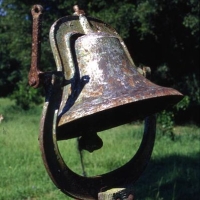
“Our science officer has determined that we are within days of the summer solstice on Eos,” he continued, “the longest day of this planet’s year. How fitting that we should suffer such a great tragedy, but have this planet’s solstice mirror our home world’s own.
“We’ll build a world here, despite our sorrow,” he said, “and we’ll start here, where we crashed, and on this beach. Let the bell that brought us all together for the past two years inform a thousand generations to come of the courage and perseverance of the people of the United Earth Ship Dawnbound.”
And Captain Nicholas rang that bell, and its sound echoed across the beach and through the lowlands and up into the hills. But mostly it echoed through our hearts. In the wake of the disaster, somehow he had once again managed to bring hope and strength to us all. It was like he was a miracle-worker.
I wanted to crack a joke about how he was a saint for doing this, and perhaps he should be renamed from Captain Nicholas to Saint Nicholas, what with all the solstice talk going on. But I didn’t dare. I don’t have his kind of charisma.
But I sure will be ringing that bell.
David M. Fitzpatrick is a fiction writer in Maine, USA. His many short stories have appeared in print magazines and anthologies around the world. He writes for a newspaper, writes fiction, edits anthologies, and teaches creative writing. Visit him at www.fitz42.net/writer to learn more.
